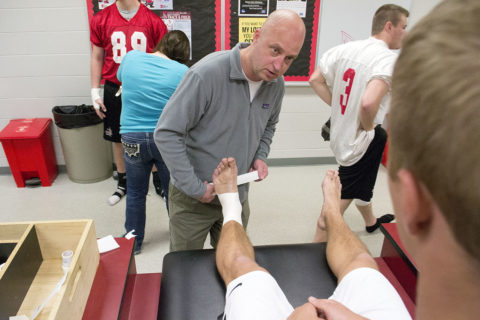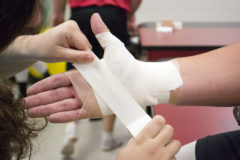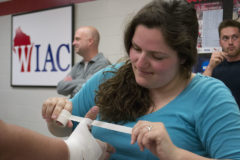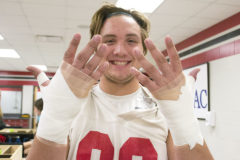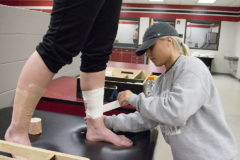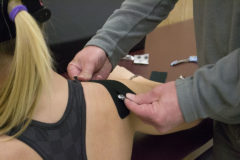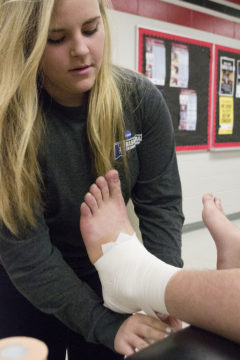Unnoticed by many, athletic trainers keep Falcons in competition
Falcon News Service
April 20, 2016
At UW-River Falls there is one job that makes all sports possible: Athletic trainers make sure athletes are physically capable of participating in sporting events, and take care of them when they’re not.
Although it’s an essential part of athletic departments, it’s a job that goes unnoticed by many.
The UWRF Athletics Department includes three trainers, two full time and one part time. Head Athletic Trainer Andrew Baker and his two assistant trainers evaluate injuries, provide treatments and help administer physical therapy to recovering athletes. For a staff of only three, covering all athletics is a challenge.
“We’re not at every practice for every team,” Baker said. “We just don’t have the staff to do that. The sports that are in season take priority.”
Currently the only two sports in season are softball and track and field according to the UWRF Sports Information website. Despite that, football, soccer and volleyball currently have spring practices and athletes of other sports are continuously conditioning. With all the activity that occurs, the need for trainers is prevalent and provides a busy schedule for the staff.
“You’re never really in charge of your schedule,” Baker said. “If a coach wants to change practice, then I need to be there to cover that and be available. My schedule is based on what the teams are doing.”
Assistant Athletic Trainer Calla Karl also has to base her schedule around the athletes, and for her that means a lot of early mornings. Because she is rehabilitating athletes who just had surgery, she spends time with them in the weight room in the mornings before their classes. Some days, Karl explained, she has to be on campus by 6 a.m., and doesn’t leave until 8 p.m.
For her, taking an injured athlete and putting them back on the roster again is the best part of her job.
“(I like) knowing that I did everything I could to help the team to succeed,” Karl said.
To help the teams to succeed she does a lot. After Karl spends her mornings in the weight room with the recovering athletes, she’ll go to one of the two training rooms on campus and get set up for that day’s events. She then will go to a practice and work with athletes. After, she helps with ice, provides treatments, and talks with the athletes and coaches.
For her, the biggest challenge of the job is making sure athletes are fully prepared to go back to their sport, and occasionally it’s not as soon as a coach would like.
“Sometimes you’re not always on the same page as the coach,” Karl explained. “So you’ll kind of butt heads a little bit because they’ll want something, but you’ll want it a different way.”
However, the challenge comes with the territory. Karl said it’s important to know that, and went on to explain what every aspiring athletic trainer should know.
“Work on your time management skills, have patience, have a great attitude, and personality,” she said.
Although the job comes with long hours and hard work, Baker said there is a reason people want to do it.
“Most of us are in the profession because we enjoy helping athletes,” he said. “Obviously nobody wants to be in the athletic training room. If you’re in there it usually means you’re injured, or not practicing, or not playing a game. Nobody wants that, including me.”
However, if an athlete is in his care, there is a light at the end of the tunnel for both of them.
“When they get back to their sport and are playing again,” he said, “that’s the rewarding part for us.”

